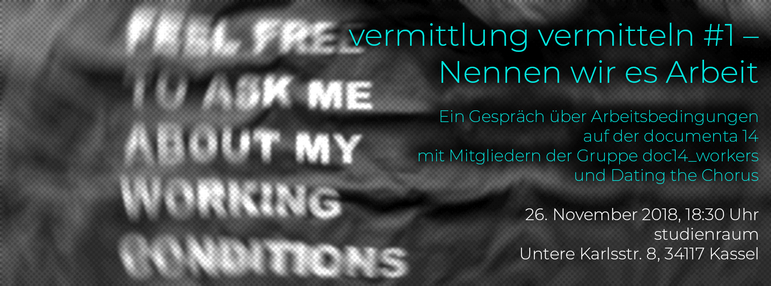Education

learning unlearning #1
Let’s call it work
A discussion about working conditions at documenta 14 with members of the group doc14_workers and Dating the Chorus
November 26, 2018, 6.30–8.00 pm
Location: study room, Untere Karlsstr. 8, 34117 Kassel
“Why do we as educators of art have to fight over and over again for the same themes within institutions?” This question was posed during a workshop on art education at documenta 14 – and certainly not for the first time there. But what about the conditions of art education – for example in reference to institutional power relations or the payment and recognition of institutional work? How do art educators organize themselves and what are their themes?
learning unlearning is a series of events dedicated to the history and present of art education in exhibitions. It reflects and discusses theories, strategies, and practices of “Kunstvermittlung.” The series suggests that documenta can be seen as a trigger and impetus that can set in motion forms of assembly, negotiation, and debate about art, about the world, and about exhibitions. The public series of events is a collaboration between the documenta professor at the Kunsthochschule Kassel and Gila Kolb (agency art education).
study room is a place of public debate run by the documenta professorship in the city center of Kassel.
The following demands were formulated at the event:
Demands – Let’s call it a forecast
- Educators as an integral part of the exhibition, and its conception and planning, from the outset
- Formation of an advisory board: a spokesperson from within the educators on the ground (former Worldly Companions or Chorus members) as a member of all documenta committees that make decisions regarding the working situation and conditions (this could also be extended to other fields of documenta’s work: installation team, supervisory team …)
- INDEPENDENT education that educators may themselves also make use of
- Fixed contact persons, organizational chart
- Tours, walks … with full recognition as art education (and not as a service at the merchandising level)
- Provision of accommodation and infrastructure (information, communication, exchange, preparation, mobility, recreation …) for educators
- Option to choose employment status as either employee or freelancer
- Remuneration of preparation time
- Reimbursement of travel expenses
- No outsourcing of the education, since this creates structural distortions in the communication of the exhibition at the artistic level and inevitably leads to a lack of clarity regarding accountabilities and responsibilities
- Establish, organize, maintain, and make accessible to the public the “Archive of Art Education” department within the documenta archiv and actively involve it in the training of documenta’s art educators, in order to support the further development of art education on the basis of the latest findings (and in historical comparison)
- Development of a group representing the interests of art educators in the Federal Republic of Germany. Goal: Consolidation of the occupational profile, negotiation of (model) fees and contracts, job descriptions, reliable regulations for taxation and improvements in connection with social security contributions (inclusion of the occupational profile in the catalogue of KSK occupations)